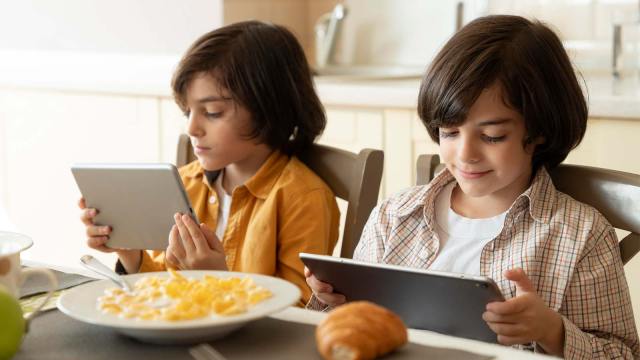Screen addiction: How to kill the devil and save your child
Managing screen time and ensuring a balance of physical activities, face-to-face social interactions and adequate sleep are essential for promoting healthy development in children.
 Managing screen time and ensuring a balance of physical activities, face-to-face social interactions and adequate sleep are essential for promoting healthy development in children.
Managing screen time and ensuring a balance of physical activities, face-to-face social interactions and adequate sleep are essential for promoting healthy development in children.Screen time in children has increased significantly over the years. Recent studies have shown that Indian children are spending an average of 2 to 4 hours daily on screens, which is significantly higher compared to pre-pandemic levels. This rise has been observed across different age groups and more in urban areas where digital accessibility is easier.
What is screen addiction?
Screen addiction is when a person uses technology excessively and becomes dependent on it. Screen addiction mainly involves smartphones, tablets, computers, and televisions. It is identified by a compulsive need to use these electronic devices, regardless of the negative impacts on daily activities and obligations such as work, school, or social relationships.
The increasing menace
An online survey indicated that 52% of children in India are exposed to over 2 hours of screen time daily. Moreover, nearly 88% of children aged between 15 and 18 months engage with screen-based media for over an hour daily. This is alarming and is causing growing concern due to its links to physical and mental health issues such as myopia, sleep disturbances and developmental delays.
Additionally, smartphone addiction has been noted among adolescents, with about 14-25% of the teenage population spending three or more hours on their phones daily. This results in lower physical activity and increased mental health concerns like anxiety and depression.
Many factors have contributed to this increase in screen time says Dr Anne Prewina Gurushekar, Consultant paediatrician at Kauvery Hospital, Tirunelveli, “With today’s advancement in technology children have a lot of information at their fingertips. Sadly, all this information is available mostly on screens which are all around us.”
Impact of Screen Addiction
Talking about the impact of excessive screen time she says, “Small children who spend a lot of time in front of the screen are prone to speech delay, memory problems and behavioural issues. Problems like low self-esteem, delayed social skills, anxiety and depression are also common.” The doctor advises that since screen addiction is a growing problem, parents must be aware and motivated and make sure that children use screen time responsibly. She says “It is up to parents to inculcate and model good behaviour to ensure that their children are healthy.’’
Serious complications can be avoided if parents become aware of how to handle their children’s insatiable desire for screen time.
 Dr.Anne-Prewina-Gurushekar
Dr.Anne-Prewina-Gurushekar
According to the Indian Academy of Pediatrics (IAP), the guidelines shared for the parents include:
- Children below the age of 2 years should not be exposed to anytype of screen except occasional video calls with relatives.
- Screen time for children between the ages of 2 and 5 years should not exceed 1 hour; the lesser, the better.
- For older children and adolescents, it is important to balance screen time with other activities that are required for overall development. These activities include an hour of physical activity (play time), adequate duration of sleep (recommended sleep time varies with age, for example, adolescents require 8–9 hours of uninterrupted sleep at night), and time for schoolwork, meals, hobbies, and family time. If any of these activities are displaced due to screen use, then it is called excessive screen time and it should be reduced.
But how can parents ensure the above guidelines are followed? Below are some tips that can help parents manage the screen time of their kids:
Tips for Parents
Some helpful tips for parents on how to manage screen time are listed here by Doctor Gurushekar:
- Meal time sanctity: Strictly avoid screens during meal times. Instead, eat meals together and engage in conversations with children so that they develop a healthy relationship with food
- Parental Control: Use parental control and teach children about online safety
- Encourage hobbies: Ensure that your child is exposed to different hobbies like sports and art
- No easy way: Avoid using the screen as a pacifier (especially for small children). Do not use the screen to treat a temper tantrum
- Encourage human interaction: While children are on their screens try to join in and make the time interactive by asking them questions.
- Modelling Healthy Behavior: Children often mimic the behaviour of adults. Parents can model healthy screen habits by reducing their device usage during family time.
- Encouraging Regular Breaks: The “20-20-20” rule is an effective way to reduce eye strain. Every 20 minutes of screen time, children should take a 20-second break and look at something 20 feet away.
Managing screen time and ensuring a balance of physical activities, face-to-face social interactions and adequate sleep are essential for promoting healthy development in children.
Disclaimer
This content is sponsored and does not reflect the views or opinions of IE Online Media Services Pvt Ltd. No journalist is involved in creating sponsored material and it does not imply any endorsement whatsoever by the editorial team. IE Online Media Services takes no responsibility for the content that appears in sponsored articles and consequences thereof, directly, indirectly or in any manner. Viewer discretion is advised.
- 01
- 02
- 03
- 04
- 05































